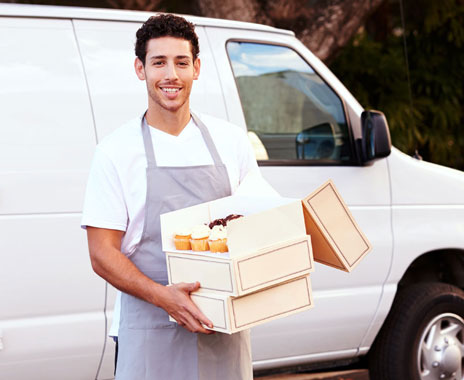Customers Want Delivery
Panera Bread recently made headlines (again) by announcing its plan to hire 10,000 new employees by end of 2017 to support delivery services. Panera forecasts that delivery will add $250,000 per year to each store’s annual revenue.
The writing is on the wall. The customers’ preference for self-service and, more importantly, convenience is clear. Recent data from a Lux Research report shows third-party delivery companies like UberEATS, Postmates, and Doordash have demonstrated how much diners are willing to pay for not having to prepare or pick up their own meals. Lux’s research shows consumers are willing to pay on average 11 percent more for each added layer of convenience.
“Online ordering has been an important growth driver,” says Bobby Shaw, former Freebirds president and CEO of Salad and Go. “The bottom line is customers are willing to pay more for the convenience of delivery. It’s just matter of finding the right vehicle.”
The Problem with Third-Party Delivery Companies
The reason why the vast majority of restaurant chains don’t work with third-party delivery companies is obvious. The extra value of being able to provide delivery to customers is not worth the price of working with them. The cost of working with a third-party delivery company typically ranges between 25—30 percent of sales, and sometimes even more. While this extra sale may be valuable to the mom-and-pop restaurant that doesn’t have resources to offer delivery on their own, restaurant chains can afford to say no.
Restaurant chains cite possible cannibalism of existing sales, and challenges relating to order management and store operations among reasons third-party delivery companies don’t make sense. Other reasons include being shielded away from the most important aspect of their business: the customer. When a customer orders via a third-party delivery company like UberEATS or Postmates, the customer is effectively the third-party delivery company’s customer and communication with the restaurant is little to none.
Huge Investments to Offer Self Delivery?
It will be interesting to see whether Panera’s huge bet on offering delivery via its own operations will payoff. In addition to hiring 10,000 new employees to support the new strategy, the company has made changes across the board, including redesigning kitchens, reworking the assembly line, and implementing new technology such as chatbots to better fit customer’s needs for more convenient ordering options. While this is a possible alternative versus working with third-party delivery companies, other less alarming options also exist.
Third-Party Logistics Services
Less well known services offered by Uber and Postmates called UberRUSH and Postmates On-Demand are attractive options for restaurant chains that still want to offer delivery without breaking the bank. Also known as third-party logistics services, UberRUSH and Postmates On-Demand provide only the logistics aspect of delivering an item from one location to another. Similar to how calling an Uber involves receiving a real-time quote (price) to bring you from your location to a final destination, logistics as a service providers provide a real-time quote to help deliver an item to its destination.
Increase Top-line Sales without Sacrificing The Bottom-line
Third-party logistics services make much more sense to franchise restaurants because it allows them to continue to interface with and own the relationship with their customer. More importantly, the customer would pay for the cost of the delivery and it would incur zero additional cost to the restaurant because the sale belongs to them. For example, if a customer places a $20 order with the restaurant, the customer would pay an additional $6 for the actual delivery (quoted by and paid to the logistics as a service provider) and the $20 would remain with the restaurant.
Getting started with logistics service providers will require franchise restaurants to integrate with their POS system. Web and mobile apps both support such integration, but chatbots tend to be the most straightforward because of the way they are designed. Chatbots have proved to provide customers the simplest and most convenient ordering flow and it is no wonder Panera adopted the technology early on. After all, research has proved that brands that continue to follow the preferences and needs of their customers tend to outperform their counterparts.
Lastly, it is also important to note that while logistics services don’t appear to make sense within both Uber or Postmates’s existing product offerings, the additional liquidity provided by such service plays an important role. Economies of scale will be how they provide cheaper and better logistics services than any one restaurant chain will ever be able to manage on their own in the future











